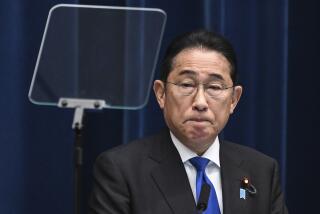Japan Lawmakers Elect Hata Prime Minister : Politics: New leader earlier warned nation of indirect tax increases exceeding planned income tax reductions.
TOKYO — Former Foreign Minister Tsutomu Hata, 58, a self-described “coordinator” whose lack of enemies made him the only candidate acceptable to the myriad parties of Japan’s coalition, was elected prime minister today by the lower house of Parliament.
With 274 votes, Hata won by a margin of 23 votes, against 207 for Yohei Kono, president of the opposition Liberal Democratic Party who, like Hata, once bolted the LDP.
Communist Chairman Tetsuzo Fuwa got 15 votes, and six other votes were invalid. Seven lawmakers were absent and two seats are vacant.
Despite haggling within the “rainbow” coalition during both the last three months under former Prime Minister Morihiro Hosokawa and a 14-day post-resignation power and policy struggle, Hata polled 12 more votes than Hosokawa received last Aug. 6 when the first coalition since 1948 was voted into power.
On Sunday, Hata warned taxpayers that future increases in indirect taxes will exceed planned reductions in income taxes, ultimately raising the overall tax burden in Japan.
In an interview with the Nihon Keizai newspaper, Hata said new revenue sources are needed to cope with the aging of Japan’s society, in which more retirees will have to be supported by a smaller work force.
Despite a $57-billion decrease in income and residential taxes, enacted in March and due to be extended, a larger overall tax burden is inevitable, he said.
Increasing deficits in the budget to fund the income tax cuts would be dangerous, he added.
Hata’s remarks, which put a priority on budget-balancing, contrasted with requests from Clinton Administration officials, who have been prodding Japan to cut income taxes as an economic stimulus to promote imports.
But in other interviews, Hata promised to reduce government regulations “to help open markets and create new industries.”
Hata also said that now is not the time to revise laws to enable Japan to implement any sanctions imposed against North Korea. The U.N. Security Council has threatened such action to punish the Stalinist state for impeding inspections of its nuclear facilities.
Foreign Ministry officials earlier said that amendments of existing laws would be necessary to halt the flow of at least $600 million a year in remittances from Japan to North Korea--an action that U.S. Defense Secretary William J. Perry said last week would be “one of the most important elements of sanctions” against North Korea.
The new prime minister was to form a new Cabinet today. Its first task will be to launch parliamentary deliberations on the 1994 budget that is already three months behind schedule.
The deliberations, however, won’t begin until May 9. A chain of national holidays--what the Japanese call “Golden Week”--begins Friday and ends May 5. Most businesses plan to shut down on the non-holiday days of May 2 and 6 to give employees 10 days off in a row, including the weekends.
Despite a 10-point platform that coalition party deputies hammered out Friday after seven days of bitter debate, Hata will face a major challenge in dealing with a split that pits his own Renewal Party, Hosokawa’s Japan New Party and the Buddhist-backed Clean Government Party against the Socialists, former Chief Cabinet Secretary Masayoshi Takemura’s New Party Harbinger and the middle-of-the-road Democratic Socialist Party.
Although Takemura said his 15-member group would vote for Hata for prime minister, he warned that his party will not automatically vote for bills that the Cabinet submits to Parliament. The party boycotted negotiations on the new platform.
By the end of June, the new prime minister must enact the budget, win an agreement on a major overhaul of Japan’s tax system and come up with a sweeping economic program to fulfill a promise to the United States to substantially reduce Japan’s $141-billion global trade surplus, including a $60-billion imbalance with the United States.
Hata said Sunday that he would present the economic program, as scheduled, to President Clinton when they meet in Naples, Italy, at a July summit of seven major industrialized nations.
More to Read
Sign up for Essential California
The most important California stories and recommendations in your inbox every morning.
You may occasionally receive promotional content from the Los Angeles Times.










